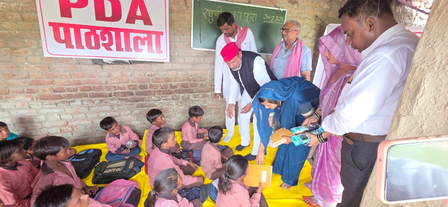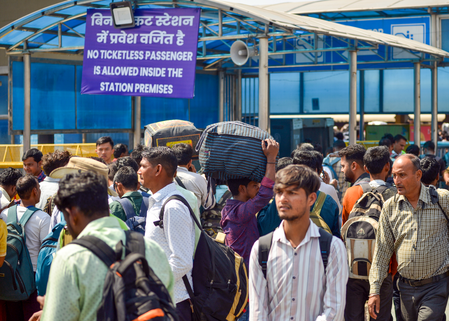
Bhadohi, Aug 1 (IANS) In Uttar Pradesh, a grassroots education initiative launched by the Samajwadi Party has ignited a fierce political and legal debate over the role of ideology in classrooms.
Branded as ‘PDA Pathshaalas’, these informal community schools have emerged in response to the state government’s plan to merge thousands of low-enrolment government schools.
The incident prompted an investigation and led to an FIR against Saroj and others under the Bharatiya Nyaya Sanhita.
A departmental inquiry has also been initiated against Assistant Education Officer Ramakant Singroul for alleged negligence.
While the BJP-led administration insists the mergers are aimed at improving resource efficiency and learning outcomes, the SP claims the move disproportionately affects children from marginalised communities.
The PDA Pathshaala model, first introduced in Saharanpur’s Ramnagar by SP worker Faraz Alam Gada, blends basic education with political messaging. Children are taught the English alphabet using names of political and social figures aligned with the party’s ethos – A for Akhilesh, B for Babasaheb Ambedkar, C for Chaudhary Charan Singh, D for Dimple Yadav, and M for Mulayam Singh Yadav.
The curriculum, according to Gada, is designed to foster early awareness of social justice and democratic values.
He argues that the BJP government’s school merger policy is a calculated attempt to erode access to education for the poor, thereby silencing future dissent.
The controversy intensified in Bhadohi district when SP leader Anjani Saroj allegedly led a protest involving schoolchildren who had recently been relocated to an Anganwadi centre.
According to officials, Saroj distributed stationery and sweets before marching the children back to their original school, displaying SP banners.
While SP chief Akhilesh Yadav has hailed the PDA Pathshaala movement as a moral victory, Basic Education Minister Sandeep Singh clarified that no schools have been permanently closed and that mergers are reversible if they cause inconvenience.
He assured that sanctioned posts remain intact and that the initiative is intended to enhance learning environments, not dismantle them.
The PDA Pathshaala experiment raises deeper questions about the politicisation of pedagogy and the future of public education in India.
Whether seen as a protest or a parallel schooling model, it underscores the growing tension between state policy and grassroots resistance in shaping the educational landscape.
In May, the Chhattisgarh government decided to rationalise more than 10,000 schools. After this decision, around 43,000 posts could also be eliminated.
–IANS
sktr/svn




